BREXIT Impact Contents CHAPTER 2: LITERATURE REVIEW
Added on 2020-12-10
40 Pages14583 Words403 Views
BREXIT Impact
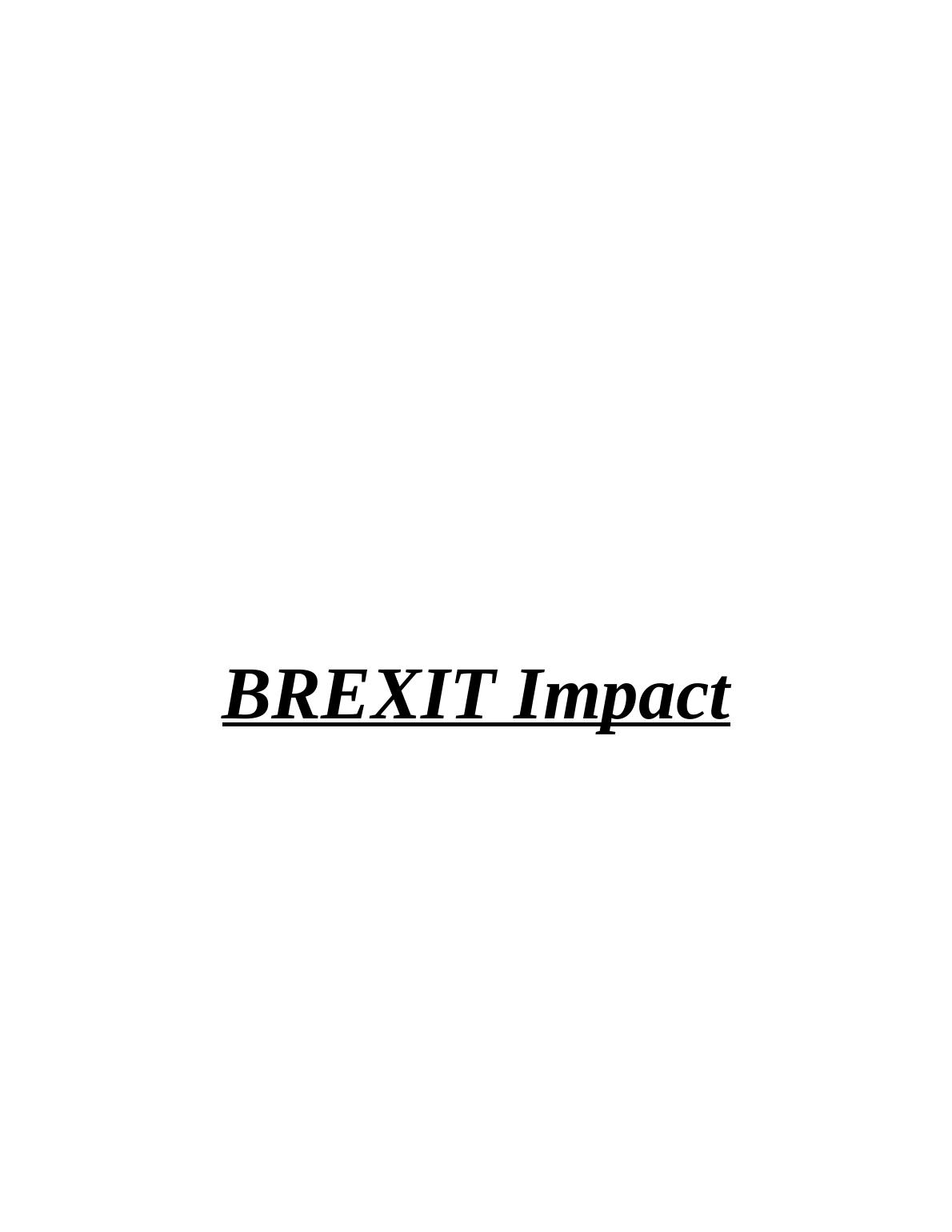
ContentsCHAPTER 1: INTRODUCTION....................................................................................................11.1 Rationale for the study...........................................................................................................11.3 Research questions, aim, and objectives................................................................................31.4 Overview of the chapters.......................................................................................................4CHAPTER 2: LITERATURE REVIEW.........................................................................................52.1 Introduction............................................................................................................................52.2 Importance of free movement for the Recruitment sector in UK..........................................52.3 Role that migrant workers plays in the food Manufacturing.................................................72.4 Recruitment Sector for the food Industry going to face shortages of staff as a result ofBREXIT.......................................................................................................................................82.5 Effect BREXIT on the existing EU labour force in UK......................................................102.6 Conclusion...........................................................................................................................11Chapter 3 - Research Methodology...............................................................................................113.1 Research philosophy............................................................................................................113.2 Research approach...............................................................................................................123.3 Research strategy.................................................................................................................133.4 Research choice...................................................................................................................143.5 Using secondary data...........................................................................................................143.6 Design of data collection.....................................................................................................153.7 Data analysis........................................................................................................................163.8 Ethics....................................................................................................................................173.9 Conclusion...........................................................................................................................17CHAPTER 4 – RESEARCH DATA ANALYSIS........................................................................184.1 Collection of Data................................................................................................................184.2 Data summary, analysis, and presentation - Question 1......................................................18
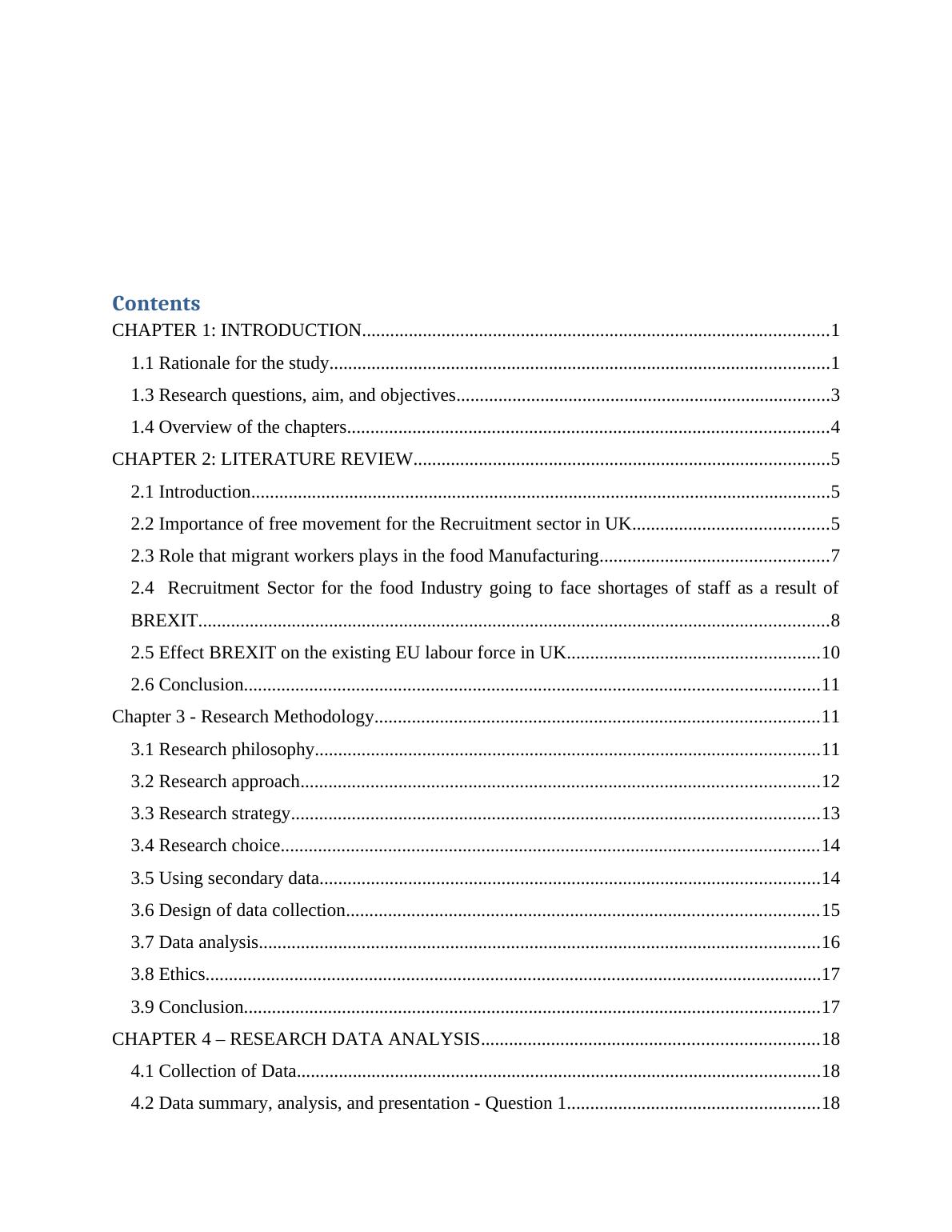
4.3. Data summary, analysis, and presentation - Question 2.....................................................214.4. Data summary, analysis, and presentation - Question 3.....................................................244.5. Data summary, analysis, and presentation - Question 4.....................................................254.6. Conclusion..........................................................................................................................27CHAPTER 5 - RESEARCH FINDINGS.....................................................................................285.1. OBJECTIVE 1 - To identify the importance of free movement for the Recruitment sector inUK..................................................................................................................................................285.2 To identify the part that migrant workers plays in the food Manufacturing............................295.3. Objective 3: identify if the UK Recruitment Sector and specifically in the Food Industry willbe faced with shortages of staff after BREXIT..............................................................................305.3 Objective 4: identify the effect BREXIT might have on the existing EU labour force in UK........................................................................................................................................................32CHAPTER 6 - SUMMARY, RESEARCH LIMITATIONS AND CONCLUSION....................336.1 Introduction..........................................................................................................................336.2 Research Summary..............................................................................................................336.3. Limitations of the research..................................................................................................346.4. Suggestions for further research.........................................................................................346.5. Conclusion..........................................................................................................................34Reflection...................................................................................................................................35REFERENCES..............................................................................................................................36
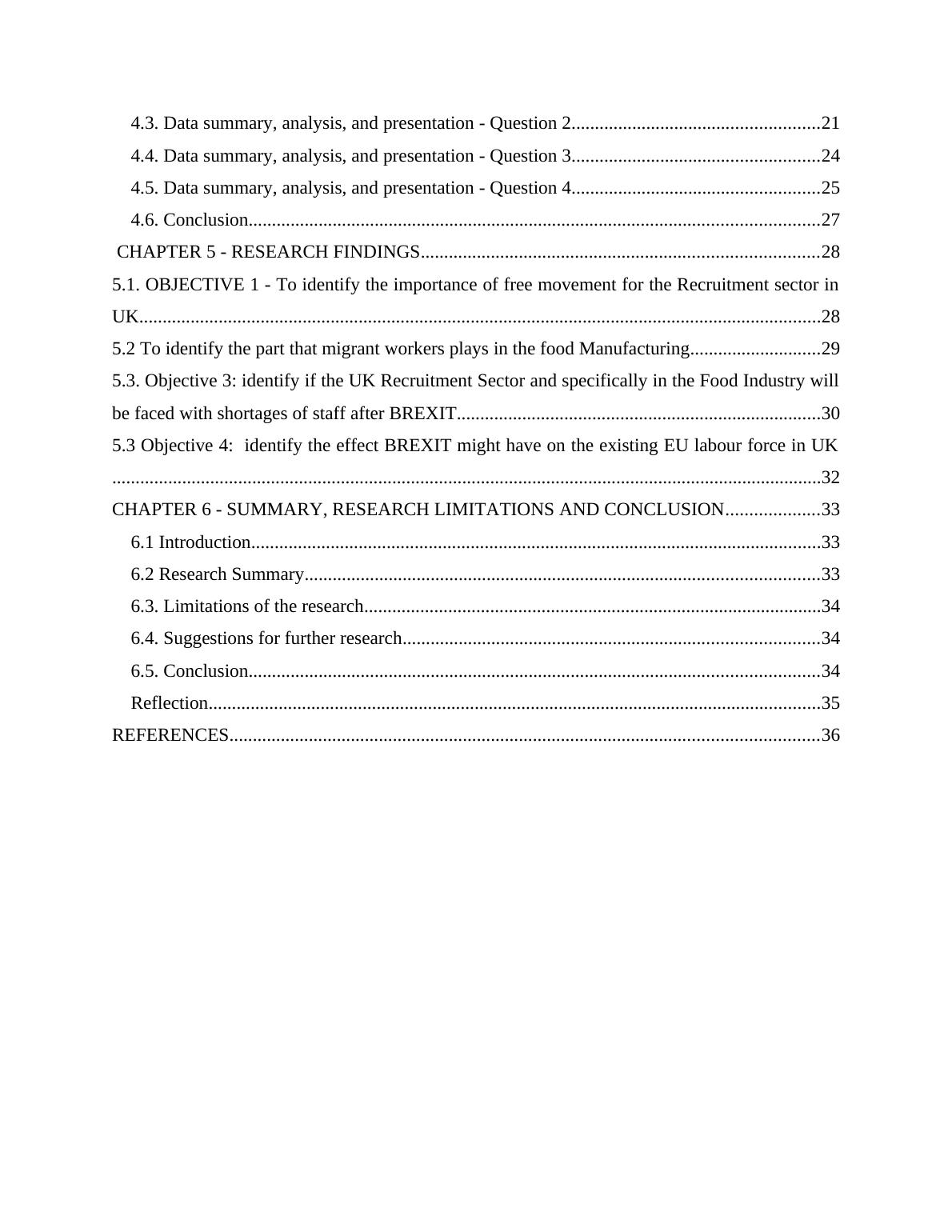
CHAPTER 1: INTRODUCTIONBREXIT is being referred to a possibility of Britain's (United Kingdom) withdrawaldecision (referendum) which was made on June 23, 2016, from European Union. This happenedwhen David Cameron was the prime minister of Britain (2010) and the head of ConservativeLiberal Democrat coalition. David basically, had pressure from his party only, and in the year of2013 a decision was made by him for developing a referendum on EU membership. BREXITreferendum is going to get finished in march month of present year where United Kingdom willcompletely evict itself from European Union. This free movement affected, United Kingdom'srecruitment sector the most which was linked to food manufacturing/production (Belke andGros, 2017) . Apart from this, as mentioned by Professor Lord Trees, future security related tofood because it is one of major obligation of government and it was basically needed forensuring that public gets affordable food with high standards as well and this rightfully can takeplace when UK left the European Union.While looking at the same and supporting the environment for betterment, it became vitalfor government to focus on continual production of food in right amount considering quality asone of major factor, so that healthy environment could sustain in future. This was the basicreason which led many food manufacturing organisations to look into their recruitment sectorbecause, these were the people who were basically required to recruit people that were havinginnovative skills. Then only, production of food with the quality could take place.1.1 Rationale for the studyBREXIT had a huge impact on United Kingdom's recruitment sector. This is happenedbecause; mainly United Kingdom's businesses rely on specialist skills from EU countries tosupplement their workforce. Based on a recent survey which has been done by CIPD (TheChartered Institute of Personnel and Development), number of European Union's worker thatwere working in United Kingdom was basically going down year-on-year with an approximaterate of 95%. This affected food manufacturing sector as well and at the current time, job market is influx because recruiters basically facing heavy pressure so that they could directly aid their clientsto have right amount of candidates with correct skills as per the requirements. They have used1
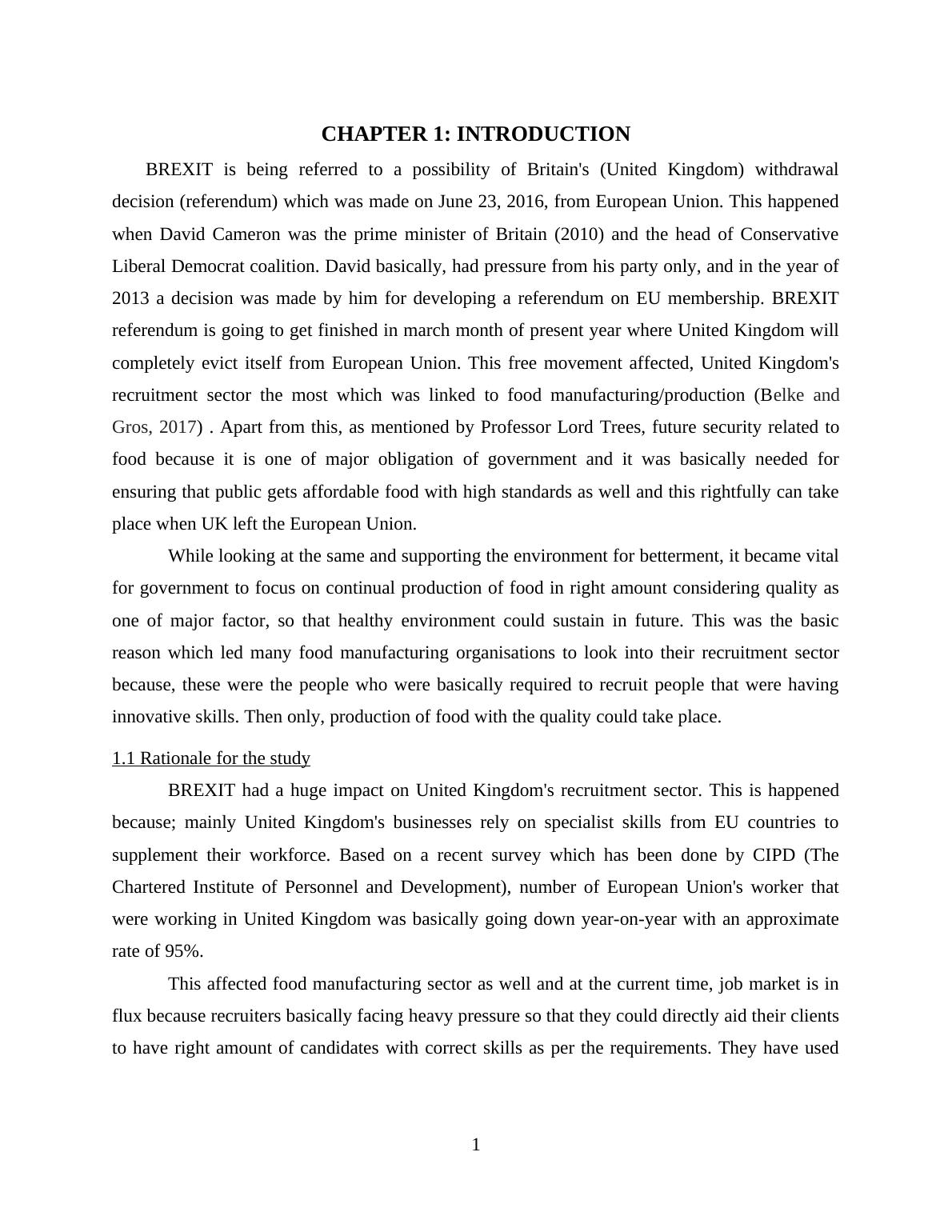
many traditional methods but it did not helped them out in offering talent to businessorganisations that were required skilful employees. Apart from this, based on LinkedIn study another issue came in front which took placebecause of BREXIT on food manufacturing industry is that recruitment sector was not been ableto find right talent and this happened because of rapid changing business environment. Scope ofpresent investigation is to evaluate the importance of free movement (BREXIT) and how its endwill directly affect United Kingdom's recruiting sector for food manufacturing/production.Present research paper will also show issues that are actually being faced by businessorganisations in existing time and on future aspects as well (Kumar, 2017).Away with this, investigating paper will also suggest decisions that are needed so thatimpact of BREXIT do not affect existing labour in food manufacturing industry and recruiterscould directly help their clients to have a range of candidates which would aid them in attainingspecific goals and objectives in specific time frame. Taking into consideration all the aspects,collection of data, interpretation and analysing models would directly help in gaining knowledgeabout BREXIT impacts and decisions that would help business organisations in recruiting rightcandidate with correct skills in specific time frame. Away with this, in order to improvecompetitive and profitable, recruitment companies need to go above and beyond job placementto act as employment consultants. This would directly help a person to get selected in rightcompany based on his or her capabilities. Since, United Kingdom's food manufacturing industryis required to improve its quality (Johnston and Buongiorno, 2017).. Basic need of this sector is to recruit employees with huge capabilities and this could be donewith the help of offering employees with great compensation, promotions and many more otherthings as well. As BREXIT unfolds, recruiters carry important and necessary role to play inassisting clients and candidates so that they could directly reach to an all new level where theycould hit their targets in specific time frame.1.2 Significance of the researchThe basic reason behind researcher have chosen the topic is that, when BREXIT tookplace United Kingdom's government has to make alterations in its policies previously they werea part of European Union. Based on an article, food manufacturing or production industry hasfaced huge number of issues like existing employees (migrants) were started looking new jobs inthe other business organisations. Apart from this, if it is talked about BREXIT it is going to look2
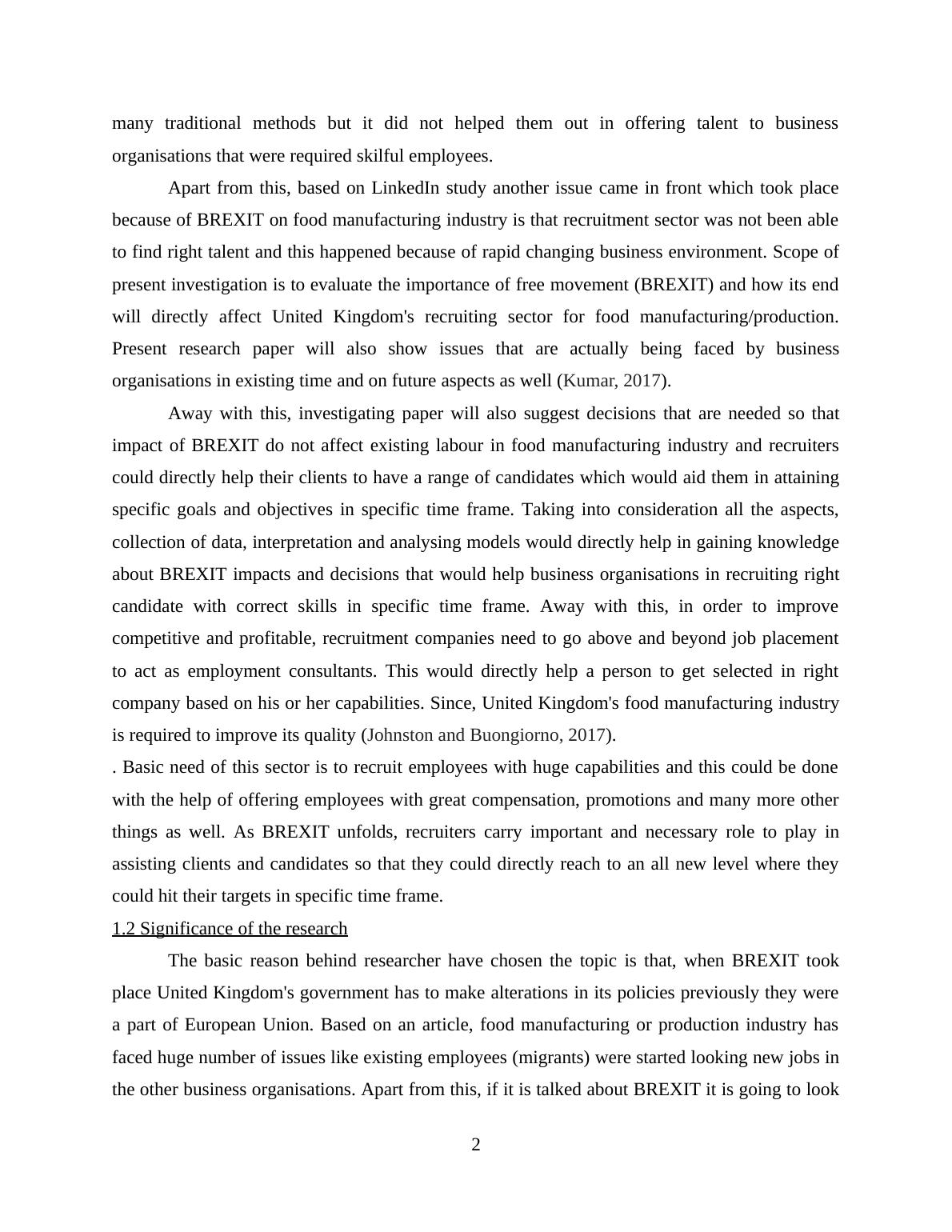
like once the deal is finalised in march of this year. Freedom of movement considering thecitizens of member stays in between United Kingdom and countries of European Union aredirectly going to get affected (Ford, 2016). The effect can be both positive and negative innature. In present time, United Kingdom could directly negotiate a deal to keep this in effect –even if it is no longer a full member of the trade bloc. Either way, international candidates don’tknow if their rights to work in the UK's food manufacturing industry, will remain unaffected, andthis has undoubtedly influenced the drop in the number of European applicants.Based on the study which has been done by LinkedIn, around 39% of recruiters havefound EU candidates are increasingly reluctant to move to the UK in general, and to London inparticular. Given the current lack of uncertainty surrounding free movement, borders, and pass-porting, along with this, general uncertainty has had a significant impact on the recruitmentindustry already. Recruiters in the United Kingdom have noted a steady drop in internationalhiring. The LinkedIn study indicates that over 30% of recruitment companies are seeing adecrease in demand for their services from core European markets including France, Germany,Italy, and the Netherlands. This impacted negatively on their performance level1.3 Research questions, aim, and objectivesThis section within a research plays a crucial role because an investigation particularlyrelies upon objectives, aim, and questions. Without these elements, particularly a research maynot get conducted. In present research, aim which has been developed by researcher i.e. “Toanalyse the impact of BREXIT on United Kingdom's recruitment sector for food manufacturing/production”. Apart from this, based on chosen topic, researcher have developed a range ofobjectives so that better knowledge could be gained in set time frame. Moreover, a range ofobjectives on set aim are mentioned below:Research objectives:To identify the importance of free movement for the Recruitment sector in UKTo identify the part that migrant workers plays in the food ManufacturingTo identify if the UK Recruitment Sector and specifically in the Food Industry will befaced with shortages of staff after BREXITTo identify the effect BREXIT might have on the existing EU labour force in UKResearch questions:What is the importance of free movement for Recruitment Sector?3
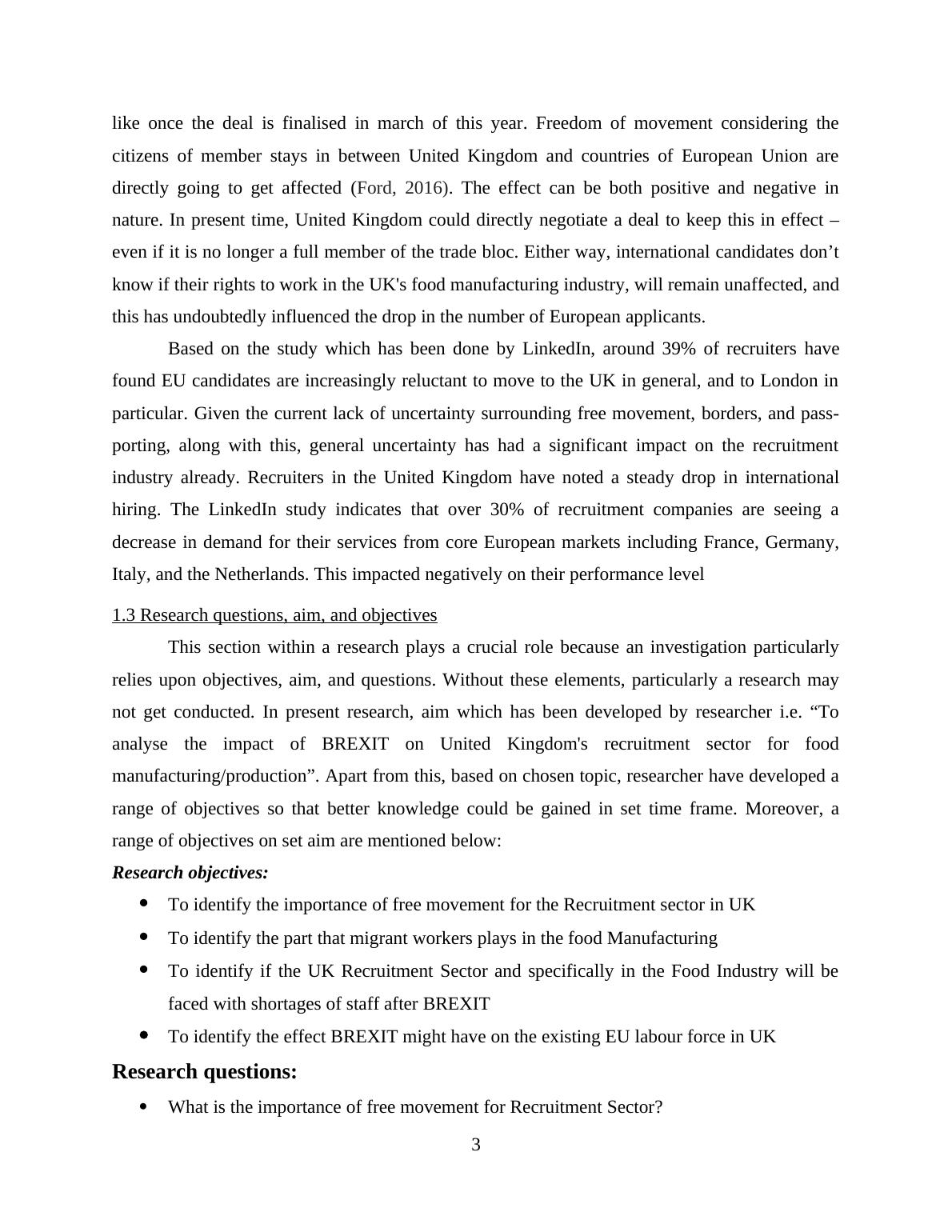
Is EU labour force a major part of UK Food Manufacturing?Is the Recruitment Sector for the food Industry going to face shortages of staff as a resultof BREXIT?Will BREXIT impact the existing Labour force within the Food Manufacturing?1.4 Overview of the chaptersIf it is talked about present investigation, in first chapter researcher is going to put focuson giving an introduction related to BREXIT and its impact upon recruiters for foodmanufacturing industry, since the quality factor have been playing an important role in foodindustry where compromise cannot be done and because of BREXIT, companies (in foodindustry) had to face a number of problems where migrant employees started switching jobs toother industries that were not coming under United Kingdom.Second chapter is going to start with a little introduction of literature review and after thatit has kept its focus on different perceptions given by different authors on set objectives on settopic i.e. BREXIT's impact on UK's recruitment sector for food manufacturing/production. Afterthat, third chapter will put light on basic research methodology section where right methods aregoing to be adopted by the research from different methods like qualitative, quantitative and soon (Cumming and Zahra, 2016). Proper analysis will help investigator to choose correct methodfor analysis, design and approach which will help investigator in reaching more closer tosolutions on issues which has been adopted by researcher. Fourth chapter will directly keep itsfocus on research findings and lastly, fifth and the last chapter will conclude and recommend onthe solutions that has been found out by the investigator. 4
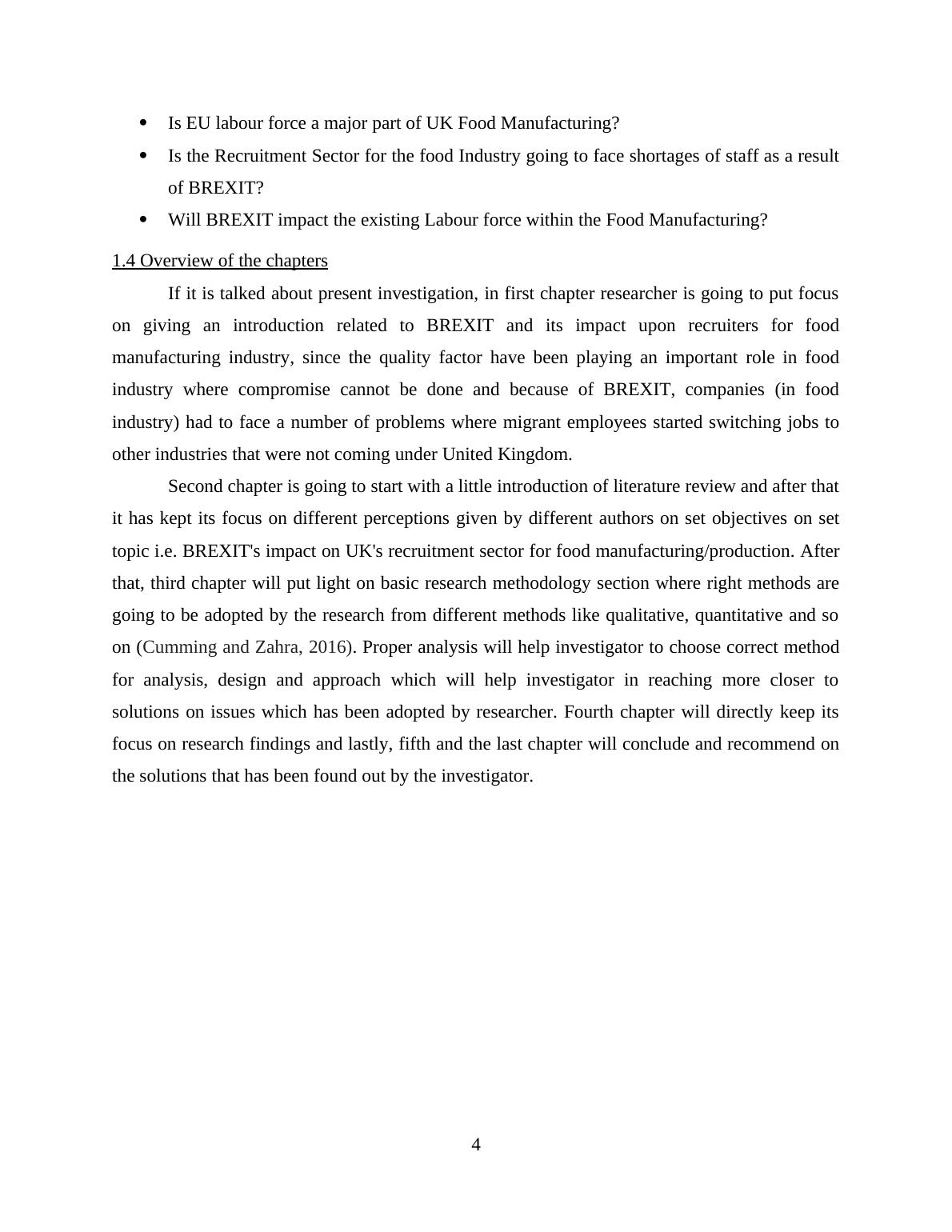
CHAPTER 2: LITERATURE REVIEW2.1 IntroductionLiterature review is academic paper that provides deep knowledge of particular topic. Inthis section, researcher often collects information from different sources and presents it in aneffective manner in front of reader. In this, researcher expresses knowledge on a single topicfrom author’s point of view (Sampson, 2017). This section also provides in-depth knowledge toscholars regarding existing study or research on similar topic. Thus, it has been identified thatliterature review is a best way to evaluate specific topic effectively. This section will evaluate about impact of BREXIT on UK's recruitment sector for foodmanufacturing industry. This literature portion will cover specified topic with some sub sectionsin order to evaluate its overall impact. Initially, it will reflect knowledge importance of freemovement for recruitment sector. Further, it will showcase information related to the ratio ofEU's workforce which works for Food manufacturing industry of UK. The literature will alsodescribe overall impact of BREXIT on recruitment sector of food industry. At last, it will coverliterature regarding impact of BREXIT on overall workforce within food manufacturing industry.2.2 Importance of free movement for the Recruitment sector in UK According to point of view of Laurence Mitchell, (2018), it has been that free movementof labour simply means that workers are allowed to work where they really want to work. Freemovement is really important for recruitment sector as well, as it helps in fulfilling job vacanciesof companies in less period of time. It has been analysed that BREXIT have initially impactednegatively on employment rate of United Kingdom as around 200 companies were closedtogether. This scenario have persuaded to UK government to think on liberalising laws related tolabours (Stevovic, 2018). As a result, government of UK have finally announced that there willbe free movement of employees in UK. As per the thoughts of authors, it has been seen that afterannouncement of BREXIT vote around 10000 employees belong to European Union have lefttheir job within three months. This has become major concern for UK companies becausemaximum of semi- skilled labour force of UK were coming from EU only. But, at the same timeit has open up various options for recruiters of UK to contact to some other sources from wherethey can hire similar kind of workforce in same range of money. This hiring employee has beenpromoted with free movement of workers only. As per overall evaluation, it can be said that5
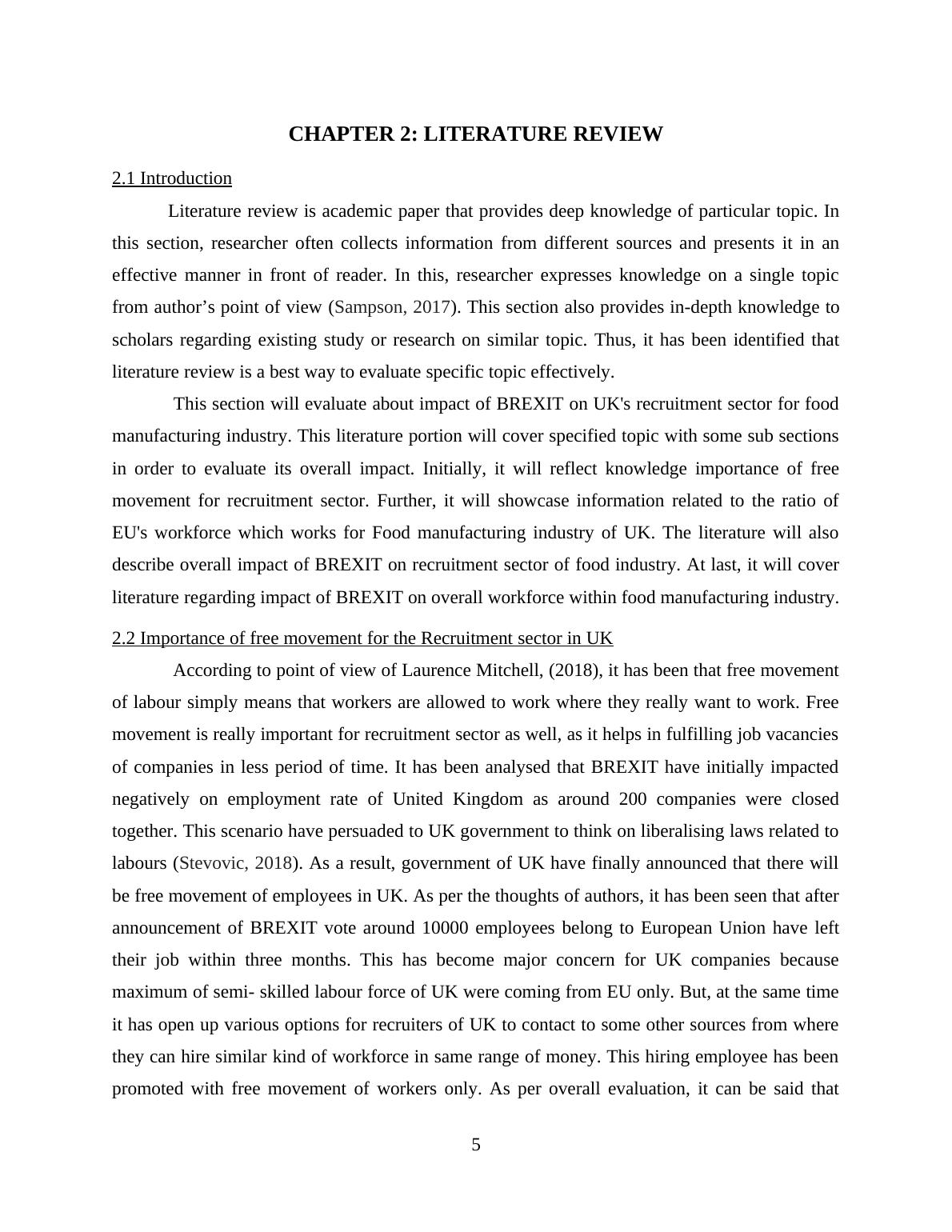
End of preview
Want to access all the pages? Upload your documents or become a member.
Related Documents
Impacts of EU Referendum Result on Human Resourcelg...
|6
|1442
|30
Effects of Brexit on UK Business and Companies (2018-2020)lg...
|39
|15026
|351
Brexit Impact on Social Health Carelg...
|10
|2763
|8
Impact of Brexit on UK Businesslg...
|13
|2746
|64
BUS 7055 Impact of Brexitlg...
|8
|1800
|22
Impact of Brexit on healthcarelg...
|3
|690
|95
